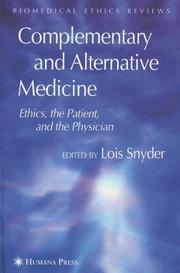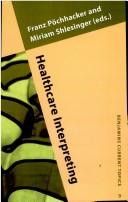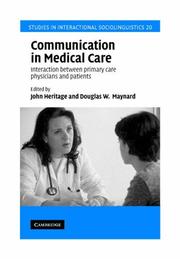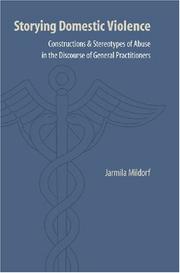| Listing 1 - 9 of 9 |
Sort by
|
Book
ISBN: 1281242640 9786611242640 0387336087 Year: 2007 Publisher: New York, N.Y. : Springer,
Abstract | Keywords | Export | Availability | Bookmark
 Loading...
Loading...Choose an application
- Reference Manager
- EndNote
- RefWorks (Direct export to RefWorks)
Empathy has long been recognized as a key element of the healing professions. Yet it is not always clear how to define the concept, how to measure it, whether there are effective methods to enhance empathy , or whether empathy really helps make treatment more effective. Drawing on evolutionary research, neurological findings, developmental and psychodynamic perspectives, and systems theory, Empathy in Patient Care explains why this human quality is essential to positive health outcomes—and how it can be measured and how professionals can benefit from its enhancement. Dr. Hojat proceeds from theoretical constructs of empathy as a core ingredient of human relationships to analyze the nuanced roles it plays in the therapeutic dyad. Twelve insightful chapters define empathy as it develops during the crucial early months of life, relate it to specific biopsychosocial aspects of health, and place empathy firmly in the context of patient care: -Findings linking higher levels of clinician empathy to a more accurate diagnosis, more positive treatment outcomes, and better patient compliance -The World Health Organization’s definition of health linked to empathy in patient care -Descriptions of effective science-based empathy-building programs -Salient discussion of empathy-related gender and career choice issues as reflected in clinicians’ practice styles -Training issues, from obstacles to empathy in medical school to whether empathy should be considered in admissions decisions -An in-depth grounding in the Jefferson Scale of Physician Empathy, complete with specific versions of this measure for practitioners, students, and patients. Written with great professional and personal vision, Empathy in Patient Care opens its readers—physicians and nurses, psychologists, therapists and social workers, students and the faculty who work with them—to emerging, creative uses for this most basic human attribute. "This book is unique in combining an encyclopedic overview of empathy with a fine-grained, precise way of measuring it. Clinicians, researchers, students, and educators will find in this book both a resource for work already done and a blueprint for what still needs to be done." Herbert Adler, M.D., Ph.D., Clinical Professor of Psychiatry and Human Behavior, Jefferson Medical College.
Physician and patient. --- Empathy. --- Attitude (Psychology) --- Caring --- Emotions --- Social psychology --- Sympathy --- Doctor and patient --- Doctor-patient relationships --- Patient and doctor --- Patient and physician --- Patient-doctor relationships --- Patient-physician relationships --- Patients and doctors --- Patients and physicians --- Physician-patient relationships --- Physicians and patients --- Interpersonal relations --- Fear of doctors --- Narrative medicine --- Psychology, clinical. --- Health Psychology. --- Clinical Psychology. --- Clinical psychology. --- Psychiatry --- Psychology, Applied --- Psychological tests --- Health psychology. --- Health psychology --- Health psychology, Clinical --- Psychology, Clinical health --- Psychology, Health --- Salutogenesis --- Clinical psychology --- Medicine and psychology

ISBN: 128083286X 9786610832866 1597453811 1588295842 Year: 2007 Publisher: Totowa, N.J. : Humana Press,
Abstract | Keywords | Export | Availability | Bookmark
 Loading...
Loading...Choose an application
- Reference Manager
- EndNote
- RefWorks (Direct export to RefWorks)
Complementary and Alternative Medicine examines the real-life implications of patient issues and the healthcare system in which care is delivered. Because complementary and alternative medicine (CAM) are not presently considered to be a part of conventional medicine, this book discusses the effect that CAM has on patients, physicians, healthcare, and policymakers. Also included are the implications that CAM has on traditional patient-physician relationships as well as the physician's ethical obligations on this subject.
Medical ethics. --- Physician and patient --- Moral and ethical aspects. --- Doctor and patient --- Doctor-patient relationships --- Patient and doctor --- Patient and physician --- Patient-doctor relationships --- Patient-physician relationships --- Patients and doctors --- Patients and physicians --- Physician-patient relationships --- Physicians and patients --- Interpersonal relations --- Fear of doctors --- Narrative medicine --- Biomedical ethics --- Clinical ethics --- Ethics, Medical --- Health care ethics --- Medical care --- Medicine --- Bioethics --- Professional ethics --- Nursing ethics --- Social medicine --- Moral and ethical aspects

ISBN: 1281066583 9786611066581 1846288088 184628807X Year: 2007 Publisher: London : Springer London : Imprint: Springer,
Abstract | Keywords | Export | Availability | Bookmark
 Loading...
Loading...Choose an application
- Reference Manager
- EndNote
- RefWorks (Direct export to RefWorks)
The discipline of obstetrics and gynecology is changing rapidly. It is changing in respect of science and technology (IVF, minimally invasive surgery) and of ethics (termination, genetics, and reproductive technology). The training for the young specialist adapts to these changes. Sadly, however, the old fashioned division of mind from body continues. Words like "holistic" and "psychosomatic" are dismissed, and those responsible for training in the UK persist in refusing to accommodate psychological modules in the training process. This book attempts to address and redress this imbalance. Failure to understand the psychological aspects of a patients presentation leave the doctor feeling vulnerable and inadequate, searching for the right thing to say, avoiding that patient in future with subsequent poor care. This book, by providing the background knowledge, empowers the obstetrician/gynecologist to be in the key coordinating role, and to communicate effectively with all parties and other health workers who may need to be involved in psychological care. This book meets the needs of doctors that are not covered by their training (e.g. a chapter on "Communication Skills. What you can do in 15 minutes", chapter on "Coping and Adjustment in Pregnancy": Giving Babies a Better Start, and chapter on "Communicating with Cancer Patients") Chapters are written by experts in widely differing areas, and show how to use the consultation to maximum benefit for the patient and doctor. Easy-to-read with stand-alone chapters, this book covers key aspects of obstetrics and gynecology, and addresses areas that are not covered in other texts. The book is relevant to all stages of obstetric and gynecological practice - from trainees to consultants (and some lay interest).
Gynecology --- Obstetrics --- Physician and patient. --- Psychological aspects. --- Psychosomatic aspects. --- Doctor and patient --- Doctor-patient relationships --- Patient and doctor --- Patient and physician --- Patient-doctor relationships --- Patient-physician relationships --- Patients and doctors --- Patients and physicians --- Physician-patient relationships --- Physicians and patients --- Interpersonal relations --- Fear of doctors --- Narrative medicine --- Medicine, Psychosomatic --- Maternal-fetal medicine --- Medicine --- Medicine and psychology --- Gynecology. --- Obstetrics. --- Psychiatry. --- Reproductive Medicine. --- Obstetrics/Perinatology/Midwifery. --- Human reproduction --- Human reproductive health --- Human reproductive medicine --- Reproductive medicine --- Health --- Mental health --- Psychology, Pathological --- Gynaecology --- Generative organs, Female --- Health aspects --- Diseases --- Gynecology . --- Reproductive medicine.
Book
ISBN: 9789020967258 Year: 2007 Publisher: Leuven LannooCampus
Abstract | Keywords | Export | Availability | Bookmark
 Loading...
Loading...Choose an application
- Reference Manager
- EndNote
- RefWorks (Direct export to RefWorks)
De impact van depressie wordt vaak onderschat. De invloed op de levenskwaliteit, met beperkingen zowel op fysiek als op psychosociaal gebied, zijn uitgesproken en groter dan bij veel andere chronische aandoeningen. Tevens wordt depressie vaak geassocieerd met somatische aandoeningen of andere stoornissen, zoals angststoornissen en middelenmisbruik. Nu is de huisarts vaak de eerste of de enige die een patiënt met depressie te zien krijgt. Om die reden is een optimalisering van de kennis over en van de competenties in de aanpak van depressie een must voor elke huisarts. Dit is nu juist wat dit handboek biedt. De huisarts wordt hier handvatten aangereikt om als poortwachter zelf depressieve klachten te ontdekken en te behandelen en/of de patiënt te leiden door het landschap van de geestelijke gezondheidszorg. Het boek vertrekt specifiek vanuit de ervaringen en vragen in verband met de aanpak van depressie bij de huisartsen. De bedoeling is niet enkel kennis over te dragen maar het toepassen van de principes en hulpmiddelen in de praktijk te ondersteunen. De theorie is zorgvuldig gedocumenteerd met schema's, kaders en overzichten. De richtlijnen worden aangevuld met antwoorden op veel voorkomende vragen, met concrete aanbevelingen en bruikbare instrumenten. Er wordt ook uitdrukkelijk stilgestaan bij de knelpunten (communicatief, organisatorisch, ...) die de huisarts daarbij kan ervaren. Dit handboek is dus in eerste instantie bedoeld voor huisartsen. Het is echter ook interessante lectuur voor andere artsen en voor wie in de geestelijke gezondheidszorg met de huisartsen samenwerkt. Het boek steunt op de ervaringen opgedaan door de auteurs in de projecten 'Tussen de lijnen' (2000-2003) en 'Stepped Care' (2004-2005), twee regionale actieprojecten rond de aanpak van depressie in de huisartsenpraktijk.
Doctor-patient relationship --- Geneesheer-patiënt relaties --- Patient and physician --- Physician and patient --- Relations médecin-patient --- Depression. --- 159.98 --- #SBIB:316.334.3M52 --- Academic collection --- #KVHB:Depressie --- Gezondheidszorg 61 --- Welvaartstaat 364.013 --- 606.322 --- arts --- depressie --- 606.3 --- arts-patiënt relatie (patiënt-arts-relatie) --- huisarts --- Emotional Depression --- Depressive Symptoms --- Depression, Emotional --- Depressions --- Depressions, Emotional --- Depressive Symptom --- Emotional Depressions --- Symptom, Depressive --- Symptoms, Depressive --- Toegepaste psychologie. Psychologische diagnostiek --- Medische sociologie: professionele aspecten van de hulpverlening --- Depressiviteit --- 616.2 --- 159.98 Toegepaste psychologie. Psychologische diagnostiek --- Depression --- Depression [Mental ] --- Diagnosis --- Treatment --- C5 --- Maatschappelijke organisaties en maatschappelijk leven --- #gsdbP --- arts-patiënt relatie (patiënt-arts-relatie)

ISBN: 9789027222398 9027222398 9786612154843 1282154842 9027292728 9789027292728 Year: 2007 Publisher: Amsterdam John Benjamins Publishing Company
Abstract | Keywords | Export | Availability | Bookmark
 Loading...
Loading...Choose an application
- Reference Manager
- EndNote
- RefWorks (Direct export to RefWorks)
This volume - the first-ever collection of research on healthcare interpreting - centers on three interrelated themes: cross-cultural communication in healthcare settings, the interactional role of persons serving as interpreters and the discourse patterns of interpreter-mediated interaction. The individual chapters, by seven innovative researchers in the area of community-based interpreting, represent a pioneering attempt to look beyond stereotypical perceptions of interpreter-mediated interactions. First published as a Special Issue of Interpreting 7:2 (2005), this volume offers insights into the impact of the interpreter - whether s/he is a trained professional or a member of the patient's family - including ways in which s/he may either facilitate or impair reliable communication between patient and healthcare provider. The five articles cover a range of settings and specialties, from general medicine to pediatrics, psychiatry and speech therapy, using languages as diverse as Arabic, Dari, Farsi, Italian and Spanish in combination with Danish, Dutch, English and French.
Hygiene. Public health. Protection --- Interpreting --- Translation science --- gezondheidszorg --- tolken --- 82.033 --- #KVHA:Medisch tolken --- Literatuur. Algemene literatuurwetenschap. Tolken --- Health facilities --- Medicine --- Physician and patient. --- Professional-patient relations. --- Translating. --- Communication Barriers. --- Consultatiegesprekken --- Geneeskunde --- Sociaal tolken --- Tolken in de gezondheidszorg --- Tolken voor hulpverleners --- Translating services. --- geneeskunde --- Physician and patient --- Communication Barriers --- Professional-Patient Relations --- Translating --- Language Arts --- Delivery of Health Care --- Communication --- Interpersonal Relations --- Information Science --- Language --- Psychology, Social --- Health Care Quality, Access, and Evaluation --- Behavior --- Health Care --- Behavior and Behavior Mechanisms --- Psychiatry and Psychology --- Medicine - General --- Health & Biological Sciences --- Translating services --- Sociaal tolken. --- Tolken in de gezondheidszorg. --- Tolken voor hulpverleners. --- geneeskunde. --- tolken. --- Doctor and patient --- Doctor-patient relationships --- Patient and doctor --- Patient and physician --- Patient-doctor relationships --- Patient-physician relationships --- Patients and doctors --- Patients and physicians --- Physician-patient relationships --- Physicians and patients --- Interpersonal relations --- Fear of doctors --- Narrative medicine --- Clinical sciences --- Medical profession --- Human biology --- Life sciences --- Medical sciences --- Pathology --- Physicians --- Pragmatics --- Health Workforce

ISBN: 9780521628990 0521628997 9780521621236 0521621232 9780511607172 1107157676 9786610541348 0511225385 0511225954 0511317794 0511607172 1280541342 0511224028 0511224699 Year: 2007 Publisher: Cambridge Cambridge University press
Abstract | Keywords | Export | Availability | Bookmark
 Loading...
Loading...Choose an application
- Reference Manager
- EndNote
- RefWorks (Direct export to RefWorks)
This 2006 volume provides a comprehensive discussion of communication between doctors and patients in primary care consultations. It brings together a team of leading contributors from the fields of linguistics, sociology and medicine to describe each phase of the primary care consultation, identifying the distinctive tasks, goals and activities that make up each phase of primary care as social interaction. Using conversation analysis techniques, the authors analyze the sequential unfolding of a visit, and describe the dilemmas and conflicts faced by physicians and patients as they work through each of these activities. The result is a view of the medical encounter that takes the perspective of both physicians and patients in a way that is both rigorous and humane. Clear and comprehensive, this book will be essential reading for students and researchers in sociolinguistics, communication studies, sociology, and medicine.
Communication in medicine. --- Discourse analysis. --- Interpersonal communication. --- Physician and patient. --- Physicians (General practice) --- Social interaction. --- Communication. --- Physician-Patient Relations. --- Physicians (General practice). --- Communication in medicine --- Discourse analysis --- Interpersonal communication --- Physician and patient --- Social interaction --- Discourse grammar --- Text grammar --- Semantics --- Semiotics --- Health communication --- Medical communication --- Medicine --- Human interaction --- Interaction, Social --- Symbolic interaction --- Exchange theory (Sociology) --- Psychology --- Social psychology --- General practice (Medicine) --- General practitioners --- Family medicine --- Doctor and patient --- Doctor-patient relationships --- Patient and doctor --- Patient and physician --- Patient-doctor relationships --- Patient-physician relationships --- Patients and doctors --- Patients and physicians --- Physician-patient relationships --- Physicians and patients --- Interpersonal relations --- Fear of doctors --- Narrative medicine --- Communication --- Practice --- Specialties and specialists --- Sociolinguistics --- Human medicine --- Pragmatics --- 800:316 --- 800:316 Sociolinguistiek --- Sociolinguistiek --- Arts and Humanities --- Language & Linguistics

ISBN: 1280823828 9786610823826 0803206992 9780803206991 9780803209886 0803209886 9780803232594 0803232594 9781280823824 6610823820 9780803205956 0803205953 1280823895 9781280823893 9786610823895 6610823898 9780803224339 0803224338 9780803207004 080320700X 9786610823642 6610823642 128082364X 9781280823640 9780803243200 0803243200 9780803207424 0803207425 1280823836 9781280823831 9780803237544 0803237545 9780803218864 0803218869 9786610823833 6610823839 9780803206953 080320695X 0803243324 9780803243323 9780803243323 0803243324 9780803225077 0803225075 9780803206373 0803206372 128082381X 9781280823817 9780803259911 0803259913 Year: 2007 Publisher: Lincoln University of Nebraska Press
Abstract | Keywords | Export | Availability | Bookmark
 Loading...
Loading...Choose an application
- Reference Manager
- EndNote
- RefWorks (Direct export to RefWorks)
On May 26, 1993, the Algerian novelist and poet Tahar Djaout was gunned down in an attack attributed to Islamist extremists. An outspoken critic of the extremism roiling his nation, Djaout, in his death, became a powerful symbol for the "murder of Algerian culture," as scores of journalists, writers, and scholars were targeted in a swelling wave of violence.
Truth Disclosure. --- Narration. --- Domestic Violence. --- Physician-Patient Relations. --- Physicians (General practice) --- Physician and patient. --- Narrative medicine. --- Discourse analysis, Narrative. --- Family violence. --- Domestic violence --- Household violence --- Interparental violence --- Intrafamily violence --- Violence --- Narrative discourse analysis --- Narration (Rhetoric) --- Clinical medicine --- Physician and patient --- Doctor and patient --- Doctor-patient relationships --- Patient and doctor --- Patient and physician --- Patient-doctor relationships --- Patient-physician relationships --- Patients and doctors --- Patients and physicians --- Physician-patient relationships --- Physicians and patients --- Interpersonal relations --- Fear of doctors --- Narrative medicine --- General practice (Medicine) --- General practitioners --- Medicine --- Family medicine --- Practice --- Specialties and specialists --- Nebraska. -- Supreme Court. --- Law - U.S. --- Law, Politics & Government --- State Law - except N.Y. --- Nebraska. --- History. --- Nebraska State Supreme Court --- Supreme Court of Nebraska --- Authors, Algerian --- Djaout, Tahar, --- Shenandoah Valley Campaign, 1864 (May-August) --- Early, Jubal Anderson, --- Military leadership. --- National socialism and justice. --- Military courts --- Sex crimes --- History
Book
ISBN: 0801895847 9780801895845 Year: 2007 Publisher: Baltimore Johns Hopkins University Press
Abstract | Keywords | Export | Availability | Bookmark
 Loading...
Loading...Choose an application
- Reference Manager
- EndNote
- RefWorks (Direct export to RefWorks)
After Harm adds important human dimensions to an issue that has profound consequences for patients and health care providers.
Religion and Medicine --- Physician-Patient Relations --- Ethics --- Medical Errors --- Forgiveness. --- Medical ethics. --- Physician and patient. --- Physicians --- Medical errors --- Errors, Medical --- Medical mishaps --- Mishaps, Medical --- Errors, Scientific --- Medicine --- Deontology --- Ethics, Primitive --- Ethology --- Moral philosophy --- Morality --- Morals --- Philosophy, Moral --- Science, Moral --- Philosophy --- Values --- Medicine and religion --- Religion and medicine --- Pastoral medicine --- Unforgiveness --- Conduct of life --- Absolution --- Amnesty --- Clemency --- Pardon --- Biomedical ethics --- Clinical ethics --- Ethics, Medical --- Health care ethics --- Medical care --- Bioethics --- Professional ethics --- Nursing ethics --- Social medicine --- Doctor and patient --- Doctor-patient relationships --- Patient and doctor --- Patient and physician --- Patient-doctor relationships --- Patient-physician relationships --- Patients and doctors --- Patients and physicians --- Physician-patient relationships --- Physicians and patients --- Interpersonal relations --- Fear of doctors --- Narrative medicine --- psychology --- Professional ethics. --- Religious aspects. --- Psychological aspects. --- Moral and ethical aspects. --- Practice --- Moral and ethical aspects
Book
ISBN: 9782802724971 2802724975 Year: 2007 Volume: 15 Publisher: Bruxelles Bruylant
Abstract | Keywords | Export | Availability | Bookmark
 Loading...
Loading...Choose an application
- Reference Manager
- EndNote
- RefWorks (Direct export to RefWorks)
La problématique de l'expression de volonté des personnes soit incapables juridiquement, soit fragilisées pour des raisons diverses, préoccupe légitimement les praticiens du droit. Il a paru utile d'examiner divers aspects de cette question essentielle liée au respect de la personne humaine en abordant d'une part des questions relevant davantage du droit familial et d'autre part certaines questions particulières au droit médical. Comme on le constatera, si la façon d'aborder ces questions peut différer, leur examen se fonde néanmoins très grandement sur des règles communes. Le premier exposé est consacré à l'examen de la capacité des mineurs face aux soins de santé. Le deuxième traitera des diverses questions liées à l'obtention et l'usage des certificats médicaux. La deuxième partie sera consacrée d'une part à l'examen de l'expression de la volonté de la personne en période de fin de vie et enfin, seront examinées certaines questions liées à la représentation des personnes incapables en relation avec le rôle du médecin.
Medical law --- Family law. Inheritance law --- Professional ethics. Deontology --- Capacity and disability --- Domestic relations --- Medical laws and legislation --- Minors --- Incapacité (Droit) --- Familles --- Médecine --- Mineurs (Droit) --- Droit --- Medical care --- Physician and patient --- Law and legislation --- 347.15-053.6 <493> --- BPB0804 --- 347.6 <493> --- 351.84*7 <493> --- Rechtspositie van de minderjarige--België --- Familierecht. Gezinsrecht. Huwelijksgoederenrecht--België --- Medisch recht. Gezondheidsrecht. Wetgeving i.v.m. ziekenhuizen--België --- 351.84*7 <493> Medisch recht. Gezondheidsrecht. Wetgeving i.v.m. ziekenhuizen--België --- 347.6 <493> Familierecht. Gezinsrecht. Huwelijksgoederenrecht--België --- 347.15-053.6 <493> Rechtspositie van de minderjarige--België --- Incapacité (Droit) --- Médecine --- Doctor and patient --- Doctor-patient relationships --- Patient and doctor --- Patient and physician --- Patient-doctor relationships --- Patient-physician relationships --- Patients and doctors --- Patients and physicians --- Physician-patient relationships --- Physicians and patients --- Interpersonal relations --- Fear of doctors --- Narrative medicine --- Law, Medical --- Medical personnel --- Medical registration and examination --- Medicine --- Physicians --- Surgeons --- Medical policy --- Medical jurisprudence --- Delivery of health care --- Delivery of medical care --- Health care --- Health care delivery --- Health services --- Healthcare --- Medical and health care industry --- Medical services --- Personal health services --- Public health --- Legal status, laws, etc. --- Medical laws and legislation - Belgium --- Medical care - Law and legislation - Belgium --- Physician and patient - Belgium --- Droit médical et bioéthique --- Certifcats médicaux --- Euthanasie --- Droit civil --- Exercice de l'art médical --- Belgique --- Droit des personnes --- Capacité --- Mineurs --- Mourants --- Incapables
| Listing 1 - 9 of 9 |
Sort by
|

 Search
Search Feedback
Feedback About UniCat
About UniCat  Help
Help News
News